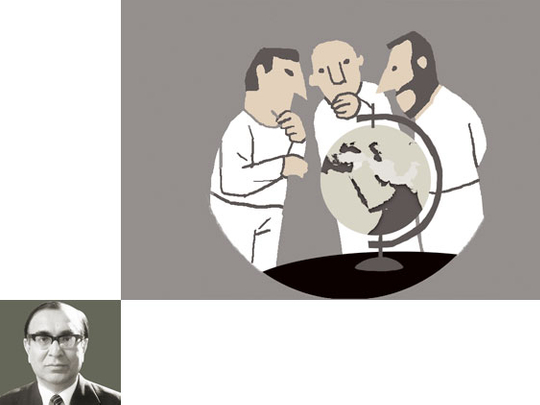
The protracted crisis in Syria is basically an issue of the sufferings of its people; its outcome would, however, also have serious regional repercussions. Understandably, Pakistan, Iran and Turkey, the three non-Arab states in the Arab ‘near abroad’ have evinced increasing concern about the impact of the Arab Spring.
The marked difference in their stances reveals a lower priority to hyped -up principles such as democratisation and human rights and an increasing attention to its strategic consequences.
The Arab awakening has diverse manifestations and regional governments face contradictions in their postures. The West, on the other hand, is driven by a shared motive of establishing a degree of control over a phenomenon subject to the unpredictability present in events of mass participation. Differences in the West pertain more to the nature and degree of outside intervention and its success, particularly when Russia and China are not on board.
Pakistan does not have the same physical proximity to the hotspots of the struggle as Iran and Turkey but its people are intensely preoccupied with Arab affairs. This concern is unmistakably rooted in the construction of Pakistan’s own identity and its political imagination.
It supports Arab causes vis-a-vis their enemies but seeks to avoid taking sides in intra-Arab disagreements. Syria has already produced an exception to this non-partisan tradition as Pakistan voted for the Security Council resolution vetoed by Russia and Pakistan’s main strategic ally, China.
Pakistan had the option to make a comprehensive statement on the situation in and around Syria and then abstain from the vote to maintain neutrality in Arab affairs. It decided to stand explicitly with the Arab League though its government had to face criticism that it acted under western influence.
In Bahrain’s case, Islamabad has put its faith in the reforms being implemented by the ruling family and in the consensus in the Gulf Cooperation Council. At present, it hopes for a miracle in Syria as its public opinion is appalled by the possibility of more bloodshed in that revered land. Additionally, the people of Pakistan evaluate events in the Arab world in terms of Israel’s gains or losses in its enduring conflict with the Palestinians, the Lebanese and Hezbollah.
Iran has altogether a different perspective as the denouement in Syria would impinge strongly on its crucial outreach to Damascus, Beirut and, no less significantly, the Hezbollah. Iran has been able to garner distinct advantages from the western failures in Iraq and the continuation of its influence in the eastern Mediterranean is vital to its security paradigm.
The dispatch of Iranian warships to a Syrian port dramatised Tehran’s resolve to fight any major shift in the regional balance of power. The just concluded election to the Iranian Majlis is expected to reinforce the regime’s continued support for President Bashar Al Assad.
The non-Arab country that matters most is Turkey where for over a decade [Prime Minister] Recep Tayyip Erdogan and his dynamic foreign minister, Ahmet Davutoglu, have swept aside the residual bitterness left behind by the anti-Ottoman Arab revolt of 1916 to 1918.
Against a backdrop of a fading dream of the full membership of the European Union, Ankara has greatly broadened the ambit of its foreign policy and made a concerted effort to reconnect with the Middle East and North Africa. Paradoxically, the West, occasionally, derides Turkey for resurrecting neo-Ottomanism but, more often, urges it to play a robust role in the region.
Ankara’s own narrative was simple and effective: it had no strategic ambitions except peace and security on its borders; its own economic success opened up new vistas in the Arab world that were being exploited to mutual advantage; its soft power made for creative cultural interaction with familiar lands but it was not offering any model of modernist Islam.
The vicissitudes of the Arab Spring have, however, detracted from the primal innocence of this declaratory policy and Turkey has had to work hard to craft policy in individual cases.
Turkish support for the Egyptian revolution was easy but recognition of anti-Gaddafi forces was not so effortless. Syria posed real issues: traditional alliance with Al Assad; the fraying of this alliance as Al Assad did not listen to Ankara; 10,000 refugees and contingent instability on the common border; possibility of Kurdish empowerment if Syria unravels, leading to possible establishment of anti-Turkish Kurdish bases on Syrian soil.
Ankara has signed on to Al Assad’s downfall though it is still cautious about western ideas such as ‘no-kill’ zones in Syria and humanitarian corridors across borders. If Al Assad survives, his valued denial of the Syrian soil to anti-Turkish Kurdish militias may change. In any case, the Turks know that militarisation of the Syrian movement would mean proliferation of arms that could reach Kurdish insurgents.
Concern for the Arab people amongst non-Arab regional neighbours springs not only from 1,400 years of shared history but also from the strategic reconfiguration of a huge land mass of unrivalled geopolitical importance by mass uprisings that can run multiple trajectories. The secret hope is that the Arab League can still find solutions without inviting foreign military intervention.
Tanvir Ahmad Khan is a former ambassador of Pakistan to several states and its foreign secretary.










